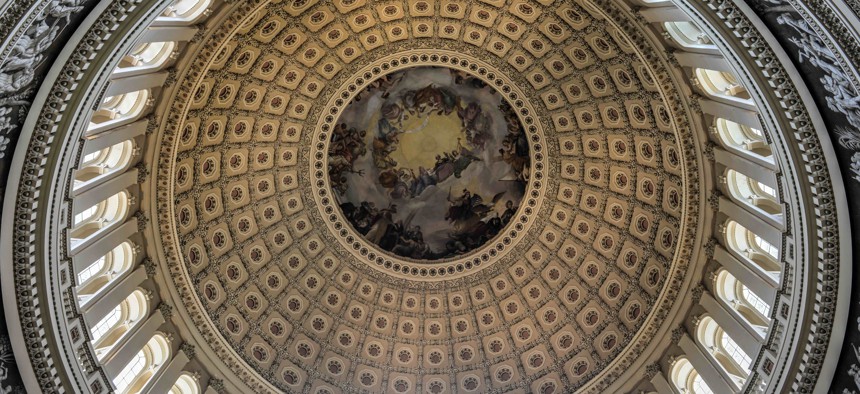Senate Appropriations Committee Passes Bill Preserving Transportation, Housing Grants

The dome inside of U.S. Capitol in Washington, D.C. Shutterstock / Felix Lipov

Connecting state and local government leaders
But there’s still plenty of uncertainty about how the overall budget-making process will unfold in Congress.
WASHINGTON — Senate appropriators voted Thursday to approve a transportation, housing and urban development bill that would maintain funding for several state and local grant programs that the Trump administration has proposed slashing.
The Senate Appropriations Committee voted 31-0 in favor of the bill, which largely mirrors legislation a subcommittee approved earlier this week. Roughly $60 billion in discretionary spending is included in the bill, about $2.4 billion above enacted levels in the current fiscal year.
“This truly is a bipartisan product,” said U.S. Sen. Susan Collins, a Maine Republican who chairs the subcommittee that crafted the bill.
Transportation Investment Generating Economic Recovery, or TIGER, grants, are allotted $550 million in the bill, $50 million over current levels. The competitive grants flow to state and local governments to help pay for transportation projects.
The Community Development Block Grant, or CDBG, program would receive $3 billion, on par with fiscal 2017. HOME Investment Partnership grants would get $950 million, the same as this year.
President Trump's budget proposal called for zeroing-out funding for all three of these grant programs, which mayors and other local leaders have identified as crucial for helping to fund infrastructure, affordable housing and a range of public services.
House Appropriators earlier this month approved a bill with lower funding levels compared to the Senate legislation for the CDBG and HOME programs—$2.9 billion and $850 million respectively. The House measure would also eliminate funding for TIGER.
Capital Investment Grants, which provide funding for major transit projects are allocated $2.13 billion in the Senate measure, roughly $280 million shy of the $2.41 billion provided in this fiscal year.
A committee report says that the recommended funding level for the grants includes about $1 billion for 11 projects that already have what are known as "full funding grant agreements" through the New Starts program.
New Starts falls under the umbrella of Capital Investment Grants and helps to fund projects that have a federal share of $100 million or more, or a total net capital cost of at least $300 million.
Examples of New Starts projects with agreements in place include two sections of Los Angeles’ Westside Purple Line subway extension, the TEX rail commuter rail project in the Fort Worth, Texas area and a rail extension on the LYNX Blue Line in Charlotte, North Carolina.
The bill would also provide $454 million for New Starts projects that meet certain U.S. Department of Transportation rating criteria in a fiscal 2018 annual report.
Here again, lawmakers did not go along with the Trump administration's proposals.
The White House budget plan requested about $1.2 billion for Capital Investment Grants, and called for funding through the program to be limited to only those projects with existing grant agreements.
In addition to providing Capital Investment Grants funding, the Senate bill would also direct the Transportation Department to continue moving eligible projects along through the program's pipeline, into phases like development and engineering.
The Senate bill does not feature the same set-asides the House legislation has for what's known as the Gateway program, a mega-project that includes plans for a new rail tunnel under the Hudson River between New York City and New Jersey.
Amtrak and New Jersey Transit trains going to and from Manhattan's Pennsylvania Station currently travel through tunnels that were built about a century ago and damaged in 2012 during Hurricane Sandy.
The House Appropriations Committee, chaired by U.S. Rep. Rodney Frelinghuysen, a New Jersey Republican, carved out as much as $900 million in its transportation, housing and urban development bill that Gateway would be eligible for.
Of that money, up to $500 million would be available through the so-called Federal-State Partnership for State of Good Repair grant program. The Senate bill includes just $26 million for this account. The Senate measure also does not contain language tailored to Gateway, which the House bill uses to allocate $400 million in Capital Investment Grants funding.
Senate appropriators rejected an amendment Thursday from Rhode Island Democrat, U.S. Sen. Jack Reed, which would have—among other things—increased fiscal year 2018 funding for TIGER grants to $1.55 billion, Capital Investment Grants to $2.6 billion, and HOME to $2.2 billion.
Some lawmakers continue to raise concerns about the lack of an overall bipartisan budget deal in Congress for the upcoming 2018 fiscal year, which begins Oct. 1, and spending caps that remain in place under the 2011 Budget Control Act.
Collins was among the lawmakers who voiced support for revisiting the Budget Control Act caps.
But she added: “To do so requires Congress to act, and that hasn’t happened yet.”
This story has been updated with additional information about provisions in the Senate bill affecting the Capital Investment Grants program and the Gateway project.
Bill Lucia is a Senior Reporter for Government Executive's Route Fifty and is based in Washington, D.C.

NEXT STORY: Is Sessions’ Dangling of 'Sanctuary City' Funding an Overstep?





